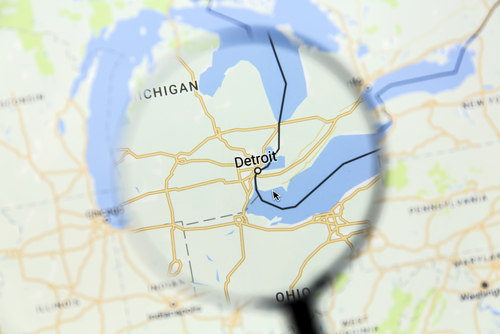Growing numbers of parents choosing not to vaccinate their children for non-medical reasons are creating “hotspots” across the country and in Metro Detroit, increasing chances for outbreaks of measles or other diseases, health researchers say.
Since 2009, the number of kindergarten-age children enrolling in school with non-medical waivers has climbed in 12 of 18 states that allow the exemptions, according to a peer-reviewed study published June 12 in the Public Library of Science journal PLOS Medicine.
At least one observer called for the numbers to be put in context, saying the hotspots are located in some of the nation’s most populated areas.
Michigan is among the states where parents can opt out of vaccinating their kids against conditions such as polio, whooping cough and diphtheria on religious and philosophical grounds. However, starting in 2015, new rules mandated that parents attend educational sessions if they seek to delay or decline immunizations.
A 2016 report by the 24/7 Wall St. website ranked Michigan the fourth-worst in the country for rates of vaccination to treat diphtheria, tetanus, toxoids and acellular pertussis.
Overall, Michigan vaccine waiver rates for school-age children climbed in 2016 and last year, state health officials reported.
Some parents fear vaccinations could cause autism in children, a theory health officials have dismissed. The CDC has reported no link between vaccines and autism.
Still, Troy, Warren and Detroit were among the areas in Michigan where more than 400 kindergartners had received the non-medical vaccination exemptions, according to the PLOS report, which collected data from state health departments and/or the U.S. Centers for Disease Control and Prevention, and analyzed the information by school year from 2009–10 through 2016–17.
“The high numbers of NMEs in these densely populated urban centers suggest that outbreaks of vaccine-preventable diseases could either originate from or spread rapidly throughout these populations of unimmunized, unprotected children,” the report said. “The fact that the largest count of vaccine-exempt pediatric populations originate in large cities with busy international airports may further contribute to this risk.”
As larger unvaccinated populations grow, particularly in highly mobile cities, the potential for vaccine-preventable disease outbreaks grows, according to Peter Hotez, professor at Baylor College of Medicine and co-editor-in-chief of PLOS Neglected Tropical Diseases, and Melissa Nolan from the University of South Carolina.
They said in a joint statement: “Measles outbreaks are of particular concern because measles is so highly transmissible and is associated with high morbidities, leading to hospitalization and sometimes permanent neurological injury or even death.”
Mark Navin, a philosophy professor at Oakland University who has studied and written about vaccination policy, notes the “hotspots” cited generally are located in some of the nation’s highest populated areas.
“Wayne, Oakland, and Macomb counties are the most populous counties in Michigan, which is the primary reason why they have the largest number of Kindergarten children” with non-medical exemptions, or NMEs, he said.”These counties do not have among the highest NME rates in the country, or even in the state.”
However, Navin points out that “Michigan counties have dramatically reduced their NME rates since 2014, after which the state began requiring families seeking NMEs to attend immunization education sessions at local health departments. This education requirement protects public health while preserving parental rights.”
Michigan schools are required to report the immunization status of kindergarten, seventh-grade and transferring students. Those without a complete immunization record or a waiver cannot be enrolled.
Preliminary Michigan Department of Health and Human Services data for 2017 showsthat 2.8-3.7 percent of Wayne County students had immunization waivers. That figure was 3.8-4.5 percent in Macomb and 4.6-12.4 in Oakland.
Among Michigan kindergartners, immunization waivers rose from 3.66 percent in 2016 to 4.2 percent in 2017, according to the state. For seventh graders, it climbed from 3.19 percent in 2016 to 3.42 last year.
Meanwhile, the department found a slight increase in overall waiver rates compared to the previous year, from 3.2 to 3.6 percent. However, that is still 25 percent lower than 2014, with approximately 8,300 fewer waivers each year compared to then, state health officials reported.
“There was definitely a noticeable decrease in waivers” since the new rules on education, said Angela Minicuci, a spokeswoman for the Michigan Department of Health and Human Services.
In Macomb, waiver rates have fallen 34 percent for the 2017-18 year since 2013-14, said Dr. Kevin Lokar, medical director of the county health department. Through February, 1,302 of the 1,350 waivers were non-medical waivers, records show.
The PLOS study figures citing Warren as a “hotspot” might have reflected its status as the county’s largest city, he said. The statistics could also be affected by the high numbers of waivers among some home-schooled students associated with the Center Line district, which serves the suburb, Lokar added.
“I don’t think the appropriate thing to conclude is there’s a problem in Warren,” he said. “I think we’ve made great progress over the last four years. We have a fair number of waivers, but those are parents who are absolutely committed to no vaccinations.”
Others caution against concluding that opt-outs have major impact.
“Exemption rates do not equate to an increase in the rates of disease in these same populations,” said Connie Johnson of Michigan for Vaccine Choice. “…Opting out of even one dose means a parent must obtain an exemption, that doesn’t mean every person with an exemption opted out of all vaccines.”

